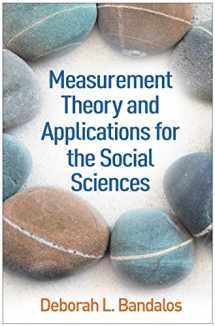
Measurement Theory and Applications for the Social Sciences (Methodology in the Social Sciences Series)
Book details
Summary
Description
Which types of validity evidence should be considered when determining whether a scale is appropriate for a given measurement situation? What about reliability evidence? Using clear explanations illustrated by examples from across the social and behavioral sciences, this engaging text prepares students to make effective decisions about the selection, administration, scoring, interpretation, and development of measurement instruments. Coverage includes the essential measurement topics of scale development, item writing and analysis, and reliability and validity, as well as more advanced topics such as exploratory and confirmatory factor analysis, item response theory, diagnostic classification models, test bias and fairness, standard setting, and equating. End-of-chapter exercises (with answers) emphasize both computations and conceptual understanding to encourage readers to think critically about the material.


We would LOVE it if you could help us and other readers by reviewing the book
Book review



